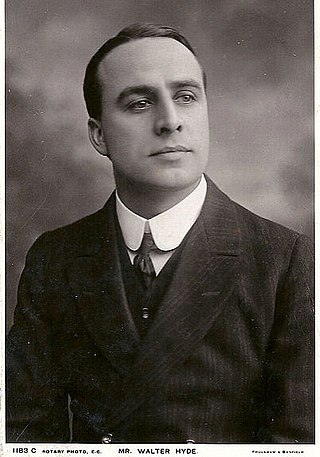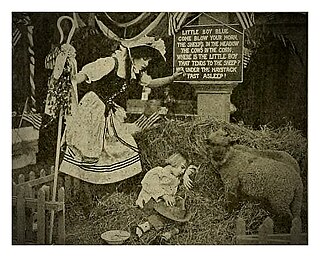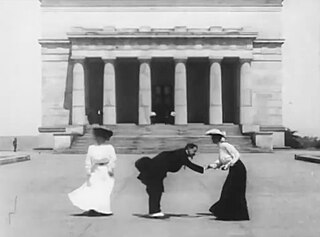Related Research Articles

The Selig Polyscope Company was an American motion picture company that was founded in 1896 by William Selig in Chicago, Illinois. The company produced hundreds of early, widely distributed commercial moving pictures, including the first films starring Tom Mix, Harold Lloyd, Colleen Moore, and Roscoe "Fatty" Arbuckle. Selig Polyscope also established Southern California's first permanent movie studio, in the historic Edendale district of Los Angeles.

Edison Studios was an American film production organization, owned by companies controlled by inventor and entrepreneur, Thomas Edison. The studio made close to 1,200 films, as part of the Edison Manufacturing Company (1894–1911) and then Thomas A. Edison, Inc. (1911–1918), until the studio's closing in 1918. Of that number, 54 were feature length, and the remainder were shorts. All of the company's films have fallen into the public domain because they were released before 1928.

Siegmund Lubin was an American motion picture pioneer who founded the Lubin Manufacturing Company (1902–1917) of Philadelphia.

The Lubin Manufacturing Company was an American motion picture production company that produced silent films from 1896 to 1916. Lubin films were distributed with a Liberty Bell trademark.

John C. Rice, born John C. Hilberg, was an American born Broadway stage actor and vaudevillian who is credited with performing the first onscreen kiss with May Irwin in 1896 for the Thomas Edison film company film The Kiss. The film was a 47-second recreation of a scene from the Broadway play The Widow Jones starring Irwin and Rice.

Le Voyage de Gulliver à Lilliput et chez les Géants, released in the United States as Gulliver's Travels Among the Lilliputians and the Giants and in the United Kingdom as Gulliver's Travels—In the land of the Lilliputians and the Giants, is a 1902 French silent trick film directed by Georges Méliès, based on Jonathan Swift's 1726 novel Gulliver's Travels.
How Brown Saw the Baseball Game is an American short silent comedy film produced in 1907 and distributed by the Lubin Manufacturing Company. The film follows a baseball fan named Mr. Brown who overdrinks before a baseball game and becomes so intoxicated that the game appears to him in reverse motion. During production, trick photography was used to achieve this effect. The film was released in November 1907. It received a positive review in a 1908 issue of The Courier-Journal that reported the film was successful and "truly funny". As of 2021, it is unclear whether the print of the film has survived. The identities of the film cast and production crew are unknown. Film historians have noted similarities between the plot of How Brown Saw the Baseball Game and How the Office Boy Saw the Ball Game. It is a comedy film directed by Edwin S. Porter, having released a year before How Brown Saw the Baseball Game.
The Bold Bank Robbery is a 1904 short crime film produced and distributed by the Lubin Manufacturing Company. The silent film depicts a group of burglars who plan and execute a successful bank heist. Company employee Jack Frawley was the film's director, also coming up with the story and serving as cinematographer; the cast's identities are unknown. The silent film was the first Lubin Manufacturing Company release to feature an original narrative.

Kansas Saloon Smashers is a 1901 comedy short film produced and distributed by Edison Studios. Directed by Edwin S. Porter, it is a satire of American activist Carrie Nation. The film portrays Nation and her followers entering and destroying a saloon. After the bartender retaliates by spraying Nation with water, policemen order them out; the identities of the actors are not known. Inspiration for the film was provided by an editorial cartoon which appeared in the New York Evening Journal.
A Prize Package is a 1912 American silent black and white comedy film produced by Siegmund Lubin.

Harold Holland was a British theatre and silent film actor and playwright. He was born in Bloomsbury, London. He played Dr. Rogers in the 1913 film Riches and Rogues, and took the lead role of Dr. Thomas "Tom" Flynn in the 1914 comedy The Lucky Vest. After having worked on Charlie Chaplin films including Shanghaied and The Bank in 1915, he was hired by the Morosco Photoplay Company in 1916 as it expanded.

Walter Hyde was a British tenor, actor and teacher of voice whose career spanned genres from musical theatre to grand opera. In 1901 he sang Borrachio in the premiere of Stanford's Much Ado About Nothing and soon appeared in London's West End in light opera and Edwardian musical comedy. He appeared regularly at the Royal Opera House in Covent Garden between 1908 and 1924, becoming known for roles in Wagner operas, among others, both in Britain and America. He was also in demand as a concert artist. In his later years he was Professor of Voice at the Guildhall School of Music where his students included Geraint Evans and Owen Brannigan.

Meet Me at the Fountain is a 1904 American silent short comedy film written, produced, and directed by Siegmund Lubin. Actors in the movie included Gilbert Sarony, a well-known cross-dressing performer. The film was inspired by Wallace McCutcheon's 1904 film Personal.
Maid to Order is a 1931 American comedy crime film directed by Elmer Clifton from a story by Doris Dembow and A. J. L. Parsons. The film featured songs from Jack Stone, Fred Thompson and George Beauchamp. Julian Eltinge, who plays the lead role, was a well-known female impersonator.

On the morning of June 13, 1914, a disastrous fire and a series of related explosions occurred in the main film vault of the Lubin Manufacturing Company in Philadelphia, Pennsylvania. Several possible causes for the blaze were cited at the time, one being "spontaneous combustion" of highly flammable nitrate film, which was the motion picture industry's standard medium for cameras throughout the silent era and for the first two decades of "talking pictures". Millions of feet of film were consumed in the flames, including most of the master negatives and initial prints of Lubin's pre-1914 catalog, several of the company's recently completed theatrical prints ready for release and distribution, a considerable number of films produced by other studios, inventories of raw and stock footage, hundreds of reels documenting historic events that occurred between 1897 and early 1914, as well as other films related to notable political and military figures, innovations in medical science, and professional athletic contests from that period. While this fire was not a decisive factor in Lubin's decline and bankruptcy by September 1916, costs associated with the disaster only added to the corporation's mounting debts, which led to the closure or sale of its remaining operations the following year.
What Happened in the Tunnel is a 1903 silent short film starring Bertha Regustus and Gilbert M. Anderson. The film was directed and shot by Edwin S. Porter, produced by Edison Mfg. Co., and distributed by Edison Mfg. Co. and Kleine Optical Co.

Little Boy Blue is a 1912 silent one-reel film produced by Lubin Manufacturing Company and distributed by the General Film Company. The movie was released on May 6, 1912. The movie featured child actor Raymond Hackett assuming the role of Harold and Marie Wierman playing Elizabeth, Harold's older sister.

The Old Maid Having Her Picture Taken is a 1901 silent short film directed by Edwin S. Porter in collaboration with George S. Fleming. The comic film depicts an unattractive old woman arriving at a photo studio to have her picture taken, and destroying all of the equipment through the power of her ugliness.

How a French Nobleman Got a Wife Through the New York Herald Personal Columns is a 1904 silent comic film directed by Edwin S. Porter for the Edison Manufacturing Company. The film is a remake of the hit film Personal, produced by the Biograph Company earlier in the year. The film is a spoof of the "fashionable marriages" known to take place between cash-strapped European nobility and American heiresses.

George W. Munroe was an American actor and comedian who specialized in female impersonation. He was actively performing in American theaters from the 1880s into the early 1920s. He performed in both Broadway shows and in vaudeville. He was best known for his comic portrayals of gossipy old Irish women.
References
- ↑ Moore, F. Michael (July 7, 1994). Drag!: Male and Female Impersonators on Stage, Screen and Television: An Illustrated World History. McFarland & Company Incorporated Pub. ISBN 9780899509969 – via Google Books.
- 1 2 Slide, Anthony (March 12, 2012). The Encyclopedia of Vaudeville. Univ. Press of Mississippi. ISBN 9781617032509 – via Google Books.
- 1 2 3 "AFI|Catalog". catalog.afi.com.
- ↑ Variety. Variety Publishing Company. July 7, 1908. p. 15 – via Internet Archive.
gilbert sarony.
- ↑ Musser, Charles (January 1, 1991). Before the Nickelodeon: Edwin S. Porter and the Edison Manufacturing Company . University of California Press. p. 169. ISBN 9780520069862 – via Internet Archive.
gilbert saroni.
- ↑ Croix, St Sukie de la (July 11, 2012). Chicago Whispers: A History of LGBT Chicago before Stonewall. University of Wisconsin Pres. ISBN 9780299286934 – via Google Books.
- ↑ Strauven, Wanda (July 7, 2006). The Cinema of Attractions Reloaded. Amsterdam University Press. ISBN 9789053569450 – via Google Books.